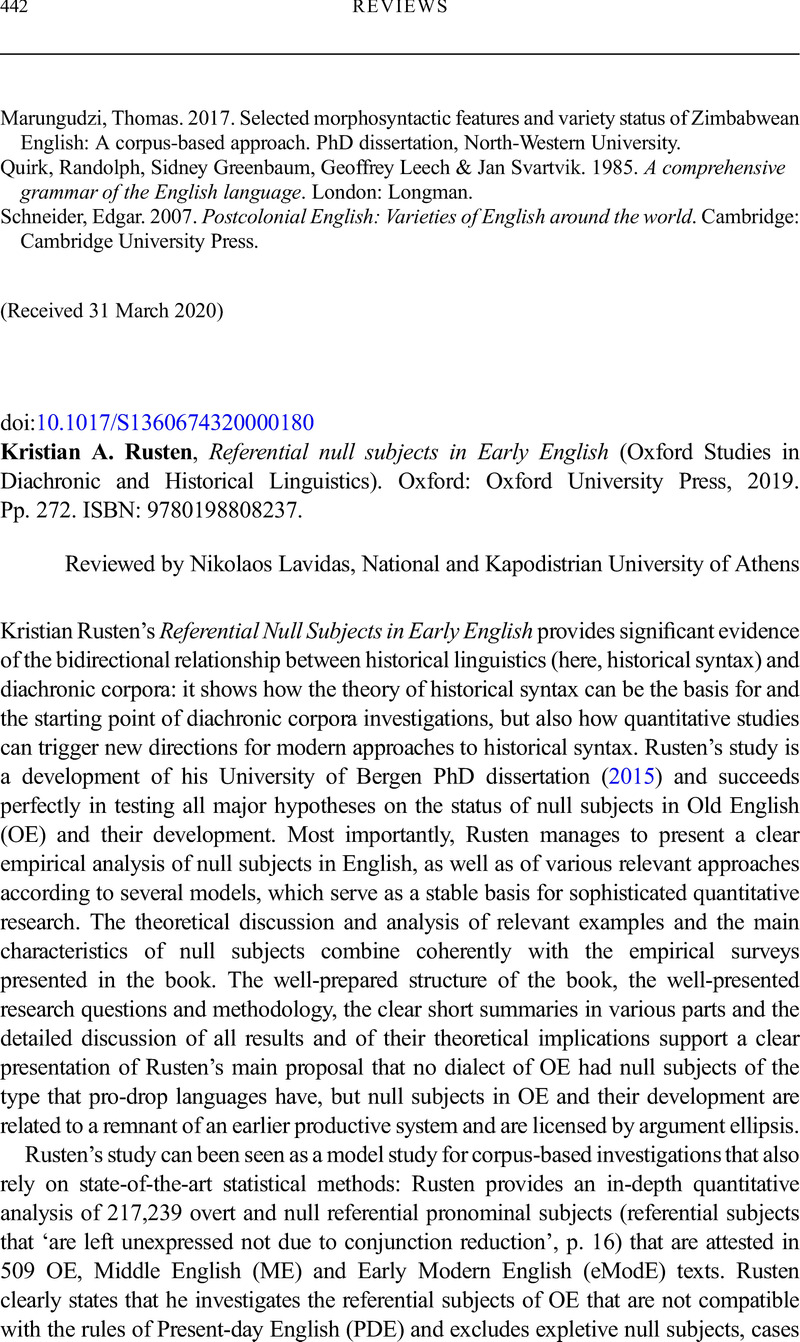No CrossRef data available.
Article contents
Kristian A. Rusten, Referential null subjects in Early English (Oxford Studies in Diachronic and Historical Linguistics). Oxford: Oxford University Press, 2019. Pp. 272. ISBN: 9780198808237.
Review products
Kristian A. Rusten, Referential null subjects in Early English (Oxford Studies in Diachronic and Historical Linguistics). Oxford: Oxford University Press, 2019. Pp. 272. ISBN: 9780198808237.
Published online by Cambridge University Press: 22 May 2020
Abstract
An abstract is not available for this content so a preview has been provided. Please use the Get access link above for information on how to access this content.

- Type
- Book Review
- Information
- Copyright
- Copyright © The Author(s), 2020. Published by Cambridge University Press
References
Ariel, Mira. 1988. Referring and accessibility. Journal of Linguistics 24(1), 65–87.CrossRefGoogle Scholar
Duguine, Maia. 2014. Argument ellipsis: A unitary approach to pro-drop. The Linguistic Review 31(3–4), 515–49.CrossRefGoogle Scholar
Gelderen, Elly van. 2013. Null subjects in Old English. Linguistic Inquiry 44, 271–85.CrossRefGoogle Scholar
Lavidas, Nikolaos. 2009. Changes in English word order and the loss of VSO. In Tsangalidis, Anastasios (ed.), Selected papers from the 18th International Symposium on Theoretical and Applied Linguistics, 243–52. Thessaloniki: Aristotle University of Thessaloniki.Google Scholar
Lavidas, Nikolaos. 2013. Stability and change in postverbal subject positions. Glossologia 21, 91–113.Google Scholar
Lavidas, Nikolaos. 2014. The Greek Septuagint and language change at the syntax–semantics interface: From null to ‘pleonastic’ object pronouns. In Gianollo, Chiara, Jäger, Agnes & Penka, Doris (eds.), Language change at the syntax–semantics interface, 153–82. Berlin: De Gruyter Mouton.Google Scholar
Lavidas, Nikolaos & Tsimpli, Ianthi Maria. 2019. Object omission in contact: Object clitics and definite articles in the West Thracian Greek (Evros) dialect. Journal of Language Contact 12(1), 141–90.CrossRefGoogle Scholar
Rusten, Kristian A. 2013. Empty referential subjects in Old English prose: A quantitative analysis. English Studies 94, 970–92.CrossRefGoogle Scholar
Rusten, Kristian A. 2015. Empty referential subjects in Old English. PhD dissertation, University of Bergen.Google Scholar
Sigurðsson, Halldór Á. 1993. Argument-drop in Old Icelandic. Lingua 89, 247–80.CrossRefGoogle Scholar
Tsimpli, Ianthi Maria. 2003. Clitics and determiners in L2 Greek. In Liceras, Juana M., Zobl, Helmut & Goodluck, Helen (eds.), Proceedings of the 6th Generative Approaches to Second Language Acquisition Conference (GASLA 2002), 331–9. Somerville, MA: Cascadilla Press.Google Scholar
Walkden, George. 2014. Syntactic reconstruction and Proto-Germanic (Oxford Studies in Diachronic and Historical Linguistics 12). Oxford: Oxford University Press.CrossRefGoogle Scholar



